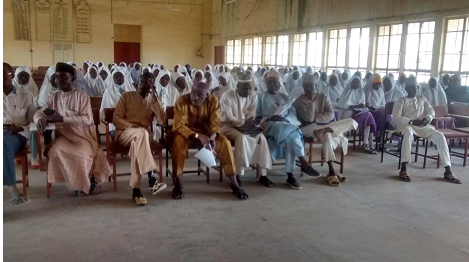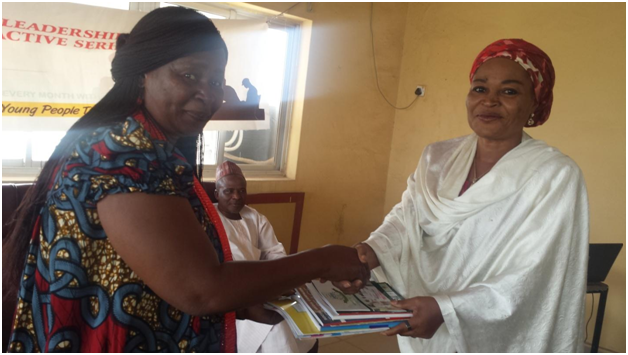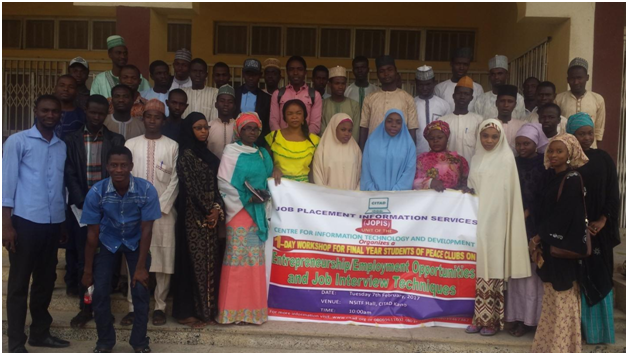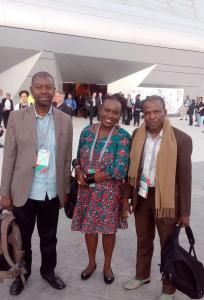Author’s name:
Y. Z. Ya’u, CITAD
Coming from Africa, and especially Nigeria, where access to the internet is characterised by different layers of exclusions and where development challenges are also layered with various deprivations, I had specific expectations on how the processes of the Internet Governance Forum (IGF) could help deepen access to and democratisation of the decision-making processes with respect to how the internet is evolving as a global process in which Africa is still a marginal space in terms of use and voice. I was particularly interested in how the internet could help in attaining the Sustainable Development Goals (SDGs) given the rather dismal performance of many African countries with respect to the Millennium Development Goals (MDGs). In a way, therefore, this background structured the choices of the panels, forums and initiatives that I attended at the IGF. The pre-IGF Disco-tech session held on 5 December, during which short presentations were made on community networking initiatives, extended my interest to include community networks as a possible solution to issues of connectivity and access in developing countries likes Nigeria.
The 11th IGF, held from 5 to 9 December at PALCCO (Palacio de la Cultura y la Communicacion), Guadalajara, Mexico, took place at a time that global attention was riveted to the initial steps of promoting the attainability of the SDGs. Thus it was not surprising that the tsars at the IGF Multistakeholder Advisory Group (MAG) and the Internet Governance Forum Support Association (IGFSA) conspired to make us link the IGF to the SDGs. Not a bad conspiracy, if you take my word.
The sessions were as interesting as they were relevant to the theme of the Forum, which was “Inclusive and Sustainable Growthâ€. Overall the deliberations were optimistic about the prospects of using ICTs in general and internet in particular as tools to realise the SDGs. This optimism was, however, tampered by three key issues.
One was the hard reality that in spite of the tremendous progress made in the last couple of years, billions of people, mostly in the developing world, remained unconnected. Not surprisingly, therefore, the need to address this problem found expression in what is now almost a working slogan, Connecting the Next Billions, and in the many sessions organised around this sub-theme. Even more on the practical side were the numerous community network initiatives that were showcased as possible alternatives and/or complementary to the dominant market-based internet connectivity models.
The second was a docket of problems that are associated with existing lived practices on the net. These include cybersecurity, gender violence online, child exploitation and pornography, the particular problems of people living with different disabilities, and misuse of the internet such as in the spread of hate speech as well as its use by insurgents and terrorist groups. This last is important for us in Nigeria where the Boko Haram insurgency has resulted in the death of thousands of people and the displacement of millions others who are rendered either as internally displaced persons within the country or as refugees in neighbouring countries, including those risking their life to cross the Mediterranean through Libya. CITAD has in the last two years been running a hate speech monitoring and countering project, including paying attention to the use of social media to recruit young people into violent activities by insurgent groups. It was an opportunity for us to reflect on our work in this area and to learn from what others are doing.
Third was what can be considered as a futuristic look at the evolution of the internet in the years to come. The challenges highlighted by Vint Cerf, a founding father of the internet, reflected this. He drew attention to a number of issues that need to be considered and addressed as we think about the internet of the future. These include:
- Mechanisms of interoperability in many years to come and preservation of digital content.
- The spectre of contesting for space between information and misinformation.
- The challenge of connecting all of the unconnected billions.
- The need to speed up the update of IPv6, given that currently it is still at 15% penetration.
Misinformation might easily be related to the election in the USA, where Vint Cerf comes from, but it is a daily feature of the social media in developing countries. In Nigeria, this has become a major issue that is pushing many people out from using Facebook. In a project being implemented by CITAD, we include fake news or rumours as part of the range of hate speech that is capable of inciting violence. Of course not all shades of rumour can qualify for this, but it is necessary that young people are not made to believe that whatever they see or read on the internet is true. That will require, as Cerf has hinted, developing a training programme that will help people to differentiate between information and misinformation. This of course is difficult to implement but it is a challenge that all those who have faith in the internet as a development tool have to confront.
In this category also were the discussions and deliberations around the Internet of Things (IoT) and especially with respect to children in the session on the Internet of Toys. There is no doubt that IoT has great potential to contribute in the attainment of the SDGs but concerns about security, privacy, and loss of control of our lives to codes have to be addressed. It would seem that there is much yet to be understood both technically and socially in relation to issues of human rights and privacy as we embrace IoT.
The undertones in the discussion about cybersecurity seem to be largely from the perspectives of both the state and private sector. While the private sector thinks about protecting investment, states are concerned about regime stability, peace and state effectiveness. In this there is the unwitting predilection to deploy cybersecurity solutions that could infringe on the rights of citizens, as human security or, more appropriately, citizens’ security seems to missing in the discussion.
Under this should also fall the session on the Internet and the Future of Work. In a session that was full of technology entrepreneurs and businesspeople, there was too much glorification of the internet as creating jobs for people it is displacing. Issues like the cost of the new jobs to displaced people, the impact of the changing nature of work on the relationship between employer and employee and the fact that new forms of employment resulting from the appropriation of internet are derogating the right to collective bargaining were glossed over. Unfortunately, this session showed a deficit in the current form of the multistakeholder model of the IGF. Labour movements are a significant component of civil society. They are also directly affected by technology, which both displaces their members as well as in some instances makes it difficult to assert the right to unionisation and collective bargaining. Yet, the voice of labour was consciously absent at the IGF.
In addition to these, there were also issues of a mundane nature, stocktaking and parade of opportunities. Two of the stocktaking sessions that I found useful were the national IGFs (NIGFs) session and the Dynamic Coalition (DC) on Accessibility. With respect to the NIGFs, the session showed the uneven development of NIGF initiatives. There were only about 50 national forums along with one thematic forum and a sub-national IGF (run by CITAD, an APC member) which were acknowledged. The session provided an opportunity for the national IGFs to raise their problems and priorities. I say “raisedâ€, because I cannot remember that solutions were offered to these, which unfortunately meant that many of the NIGFs would have to go back home and think for themselves. My other reflection was that the IGF process must expand beyond the horizontal dimension of the multistakeholder mechanism (bringing government, private sector, academia, media, civil society, etc. together) further down to the grassroots (engaging different layers of these stakeholders), thus paying more attention to sub-national IGF initiatives that would provide a platform for grassroots voices.
Of particular importance to me also was the session about the DC on Accessibility. While participants generally agreed that the hosts made a considerable effort at accommodating people with disabilities and made the deliberations of the IGF accessible to them, two major shortcomings, not relating to the hosts, were observed. One was at the online registration level. The registration website and the registration process were not friendly to people who are visually impaired. The second was that while the passion of the IGF is about inclusivity, having to hold a different session for people living with disability means that inclusivity is still far from being substantively addressed in practice.
Equally important in testing the inclusive drive in the discussions over the internet in general was the submission by a panellist that discussions in the IANA transition process were in English. Multilingualism as a major tool for inclusion was thus yet to be mainstreamed. It would appear of course that with the IGF 2016, English was the ultimate working language, as transcriptions were in English even where the speakers were speaking in either French or Spanish or Portuguese. The same panellist also commented on the uneven representation and participation in ICANN among the different regions of the world, a salient marker of the digital divide.
The issue of gender violence online was the subject of several sessions, but from the perspective of solution seeking, it seems to me the session that was more productive was “An ‘Internet of Women’ by 2020: WSIS Vision into Reality (WS15)â€. Here in addition to researched presentations, a number of organisations featured what they were doing to address both unequal access to the internet by women and gender violence online (including child molestation online). The organisations that made presentations included Microsoft, Google and Verizon as well as the ITU, showcasing the various initiatives they have for which they would like to partner with other stakeholders. The Commonwealth Telecommunication Organization (CTO) also presented on the various initiatives that it was involved in and invited interested bodies to link up with it in a different session.
The stocktaking season around the IANA transition also raised a number of significant issues. One was, how could the multistakeholder model be taken over to other arenas? The celebration of the multistakeholder model, however, did not allow for a critical interrogation of its democratic content. This is not say that it is entirely non-democratic, but that it can be made much more democratic than it is now. There was also a reflection that civil society representation in the process was not very effective in the sense that civil society, as a non-homogenous entity, tends to be divided, with different perceptions and interests, unlike the private sector or even government.
Given the high cost of attending the IGF, remote participation had been thought of as a way to get many people to engage with the process without having to travel. This challenge to travel seems to affect Africa in greater measure if attendance at the 2016 IGF was to go by. Yet the three challenges identified at the session on How to Make Remote Participation Sustainable – that is, access, capacity and language – seem to critically apply to Africa and other developing regions. Access is so extremely poor that Ms. Mary Uduma, the coordinator of the West African IGF, reports that the sub-regional forum could not have remote participation at its forum in Niamey, Niger Republic because of access-related problems. To deepen participation, APC may consider building the capacity of its members in setting up and running remote participation hubs. CITAD did run a remote participation hub in 2015 but only for just two days, and even for those two days, only for a selection of sessions and with the frustrating situation of an inability to make contributions to the IGF in session.
Some other sessions were geared towards improving some specific stakeholders’ participation. For example, the session on the Youth Coalition on Internet Governance (YCIG) focused on both the challenges that young people face in attending the IGF and how to increase their participation in future rounds. The forum claimed to have brought people under 30 together, and I was wondering how the gatekeepers of the session identified the age of the participants. As I was over 30, I peeped and left but I was sure there were others like me, who were more than 30 years old, that took part in the session!
One aspect of capacity building that was absent from discussion is the possibility of developing countries transiting from mere ICT consumers to simultaneous producers and consumers. The fact that internet and more generally ICTs are critical to the realisation of the SDGs would mean that bridging the digital divide is not just about access, important as that is. But of course, this was not surprising given that, first, this was an internet governance forum and not ICT governance (yet of course the internet is not all conduits but also the means of accessing the conduit as well as the content that goes into the conduits). Second, of course, there was the conspicuous absence of governments from developing countries, meaning that they were not expected to have a voice to raise their cause.
One of the innovations this year was the lightning sessions. This is a more or less informal session in an open place that takes about 30 minutes or so. This allows participants to commune in an informal setting on issues that might either have not found space in the main programme or that have arisen from the formal sessions. They can help develop a community of interest, allow for greater networking and more thorough interrogation of issues, and help push issues that missed the deadline to find some space, but they also extend the frontiers of the informality of the IGF to a higher level. They also, if not controlled in some way, can become contesting sessions with formal sessions. In a way they can become the alternative IGF.
Is this a conversation with no politics? The promoters of the IGF clearly do not want issues to be clouded by political consideration. In a way this allows for a wide range of shades of actors, opinions and political tendencies to engage in the deliberation. Yet, it is clear that many of the issues are not just technical or even socioeconomic and cultural issues. They are political issues which politics has to deal with. The weathering away of political superstructure from the IGF can be seen at the level of the composition of participants at the IGF 2016. Civil society, which lacks political power, dominated with over 45.2%. This was followed by the technical community with 28%. Government participation came second only from the bottom.
Does this have implications? Yes, it does, at least for developing countries like mine. In the first instance, our governments do not take the IGF very seriously. It is in fact instructive to note that the presence of governments from Africa and Asia was the lowest at IGF 2016. Nigeria, whose Ministry of Communication, the highest policy coordination and implementation organ of the government, did not care to attend the IGF, is one of those governments that do not accord the IGF the importance it deserves. Being absent in this forum means that they are not adequately informed about many issues raised and debated. With the private sector keenly present and actively participating, our governments would find it difficult to engage the private sector on terms that would be in the overall collective interest of citizens of these countries, not just of investors. It also affects the capacity of civil society to win concessions at national level on issues that are deliberated upon at the IGF. It additionally weakens the multistakeholder mechanism at national level. But even more important, it unwittingly confers a substantive perception, if not a marker for the IGF, as a mere discussion table, leaving serious decision making to intergovernmental fora in which civil society has no space.
Did I miss anything at IGF 2016? Yes, several things. I wished I had the time to attend a number of sessions that I had interest in but which clashed with other equally important sessions. For example, given my work back in Kano, Nigeria, I would have loved to have attended the session on “Social Media and Youth Radicalization in the Digital Ageâ€, which I missed. I also would have attended “The Role of Judiciary Systems and Internet Governance†and several others. What this means is that there is a need to put more thought into the way in which IGF sessions are structured and timed. No doubt given the multiplicity of actors and the diversity of interests, this is a big challenge, but if clear sub-themes run through several days and non-overlapping sub-themes run parallel, things may be better.
Some final words: as we discussed, with the ambience of tequila in the air (for some in the throat!) and the expressive tunes of mariachi music, the promise for a free, neutral, safe, open, resilient and decentralised internet was alluring. Yet, the reality is that we all return back to our respective countries, and those like us, who see obscene exclusion on the net that counters all these adjectives, have their tasks cut out for them!
Observations
- The fact that civil society constituted close to 50% of the participants at the IGF is attributable to the importance that organisations like APC have placed on the IGF. Yet, it must be noted that this number does not qualitatively translate to a commensurate update of civil society voices at either national level or even in other international fora where internet issues are decided.
- It did not appear to me that APC made a deliberate effort to make effective use of the presence of its members to cover as many important sessions at the IGF as possible. This is probably due to the need to respect individuals’ and member organisations’ choices to keep to what they consider important or relevant to their work. The net result of that is that often we crowd up at some sessions, and are missing at some others that are equally important. In a way, this crowding at certain session reflects our communality of interest, which is good, but we may gain something by also spreading out in a strategic way.
- Labour is a major component of civil society. Its members are also directly impacted by technology, especially the internet. Yet at the IGF the voice of labour is absent.
- With all its promises, the IGF is a discussion table, not a decision-making table. Other platforms, where civil society presence or voice is often either minimal or absent, are where the important decisions are made.
- It would seem that the focus of APC engagement at the IGF this year gave much weight to community networks. This was understandable given that connectivity remains a major issue across the world.
- Government participation, especially from Africa, was low.
- Participants from developing countries, such as those in Africa, were few.
- With over 47% of the participants being female, IGF 2016 must rank as one of the most gender-balanced of global forums.
- While community networks present an important mechanism for bridging the digital divide, a broader discussion on bridging the digital divide did not occur at the IGF.
- APC constituted the largest segment of the civil society participation at the IGF.
Suggestions
- There is a need for APC members to claim the civil society space in their respective countries to ensure that civil society voices are visible and listened to at national IGFs, and as well taken up and implemented by relevant stakeholders
- There is a need to finds ways for civil society to reach some consensus on key issues that are taken to decision-making tables such as the UN agencies
- A number of private sector organisations such as Google, Microsoft and Verizon have programmes that APC should leverage to drive digital inclusion across the different countries where exclusions are the norm.
- Given the wide array of sessions, programmes and initiatives at the IGF, there is a need for APC to be more strategic in terms of both assessing which sessions to focus more attention on and how to spread its membership across these sessions, without necessarily making individual members sacrifice their individual/organisational interest or focus.
- APC should find ways of moving the multistakeholder model to other critical platforms where decisions are taken.
- It would be good for APC (and its members) to engage labour organisations with a view to getting them on board at IGF 2017.
- Issues of gender and disability are not only signifiers of exclusion but also of specific problems faced by women and people with disabilities as they negotiate the use of the internet. It would be good if APC could devote more attention to campaigns to make the internet safe for women and friendlier to people living with disabilities. In connection with this, APC and its member organisations can partner with such organisations as the ITU, Google, Microsoft, Verizon and others that have resources to deploy in this direction.
- APC, especially in Africa and Asia, should work with regional political groups such as the African Union and the United Nations Economic Commission for Africa (UNECA) to get governments in these regions to begin to afford participation at the IGF greater priority.
- It could be good for APC to pool the different possibilities of partnerships, initiatives and opportunities and share them with all members.
- There is a need for APC member organisations in Africa in particular to work with other civil society organisations to sensitise stakeholders to participate more actively in the IGF processes, even if through remote hubs.
- APC needs to deepen the capacity of its member on strategies for responding to internet shutdowns.
- Having made a significant impact at the global level of the IGF, APC should lead the process of extending the IGF processes to the grassroots through actively pushing for and organising sub-national-level IGF processes. This also includes capacity building for remote hub hosting and participation.







